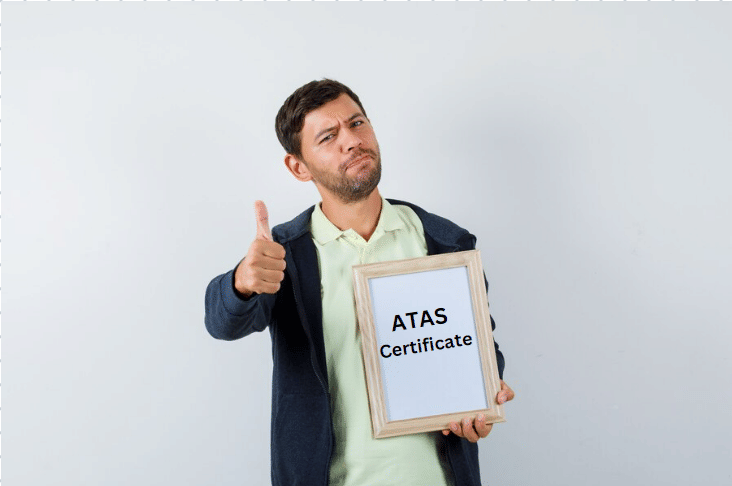The Academic Technology Approval Scheme (ATAS) certificate is a document that allows international students from certain countries to study in the UK at the postgraduate level in sensitive subjects. The ATAS certificate UK is required in addition to a student visa.
Getting an ATAS (Academic Technology Approval Scheme) Certificate in the UK can be quite a hassle, especially for international students. The whole application process involves loads of paperwork and following strict rules, which can really throw you off and make things feel overwhelming. Our blog on ATAS certificate UK aims to ease processes for you.
What Is ATAS Certificate UK?
So, let’s talk about ATAS – it’s short for “Academic Technology Approval Scheme.” If you’re an international student under UK immigration control aiming to take specific sensitive courses in the UK, especially those linked to weapons of mass destruction (WMD), you’ll need to get yourself an ATAS certificate.
Now, who needs this? Well, mostly postgrads and researchers diving into fields like science, engineering, and tech, plus undergrads going for integrated master’s programmes. If you’re from outside the European Economic Area (EEA) and Switzerland and you’ve picked an ATAS-eligible course, this is a must-do.
The whole deal with ATAS was set up by the UK Foreign and Commonwealth Office to keep tabs on info that could be used for making WMDs. And here’s the kicker – your ATAS certificate is super important for getting your UK student visa. When the Entry Clearance Officer checks out your visa application, they’re gonna want to see that ATAS certificate UK. Forget to include it, and you might find your visa denied.
Which Courses Require An ATAS Certificate?
UK ATAS certificate will be required for the following courses:
- Naval Architecture
- Veterinary Science
- Chemical, Process, and Energy Engineering
- Artificial Intelligence
- Molecular Biology, Biophysics, and Biochemistry
- Microbiology
- Astronomy
- Mechanical Engineering
- Pharmacology, Toxicology, and Pharmacy
- Mathematics
- Materials Science
- General Engineering
- Civil Engineering
- Physical Geographical Sciences
- Materials Technology not otherwise specified
- Animal Science
- Genetics
- Polymers and Textiles
- Anatomy, Physiology, and Pathology
- Industrial Biotechnology
- Botany
- Electronic and Electrical Engineering
- Operational Research
- Aerospace Engineering
- Production and Manufacturing Engineering
- Chemistry
- Biology
- Physics (including Nuclear Physics)
- Metallurgy
- Computer Science
How To Apply For An ATAS Certificate UK?
When you’re applying for an ATAS certificate, make sure to do it before you ask for a visa or renew one. Expect the certificate to take at least 20 working days to process. Here’s what you’ll need to apply for it online:
- Your complete educational history.
- Details of any current or past jobs.
- If you’ve published any papers.
- If you’ve applied for ATAS before.
- If you’re eyeing optional courses for a taught Master’s programme.
- For research degrees, provide info about your research field with a short description.
- Names and contact details of two references.
- Proof of your financial situation.
How Long Does The ATAS Certificate Take To Arrive?
For International Students:
Expect your ATAS application to take a minimum of 4 weeks to process. It might even stretch to 30 or more working days during busier times, like between April and September.
For Researchers:
If you’re a researcher, plan for your ATAS application to take around 2 weeks to process. However, during peak times from April to September, it could extend to 15 or more working days.
What To Do In Case Of Rejection?
This is not a usual occurrence, however, it is always best to consider the worst possible situations. If you’re having trouble with your ATAS certificate UK, it’s a good idea to reach out to the FCO for assistance. You can also try contacting your university for help with any questions you have. For guidance on reapplying for the ATAS credential, check out your university’s website or get in touch with their admissions office.
Countries Which Do Not Require An ATAS Certificate
If you’re from the UK or the following countries, you will not need to apply for an ATAS certificate:
- Czech Republic
- France
- Norway
- Malta
- Belgium
- Singapore
- Denmark
- Australia
- Hungary
- Republic of Cyprus
- Luxembourg
- Poland
- Ireland
- South Korea
- Japan
- Portugal
- Romania
- United States of America
- Iceland
- Estonia
- Canada
- Spain
- Netherlands
- Finland
- Italy
- Slovakia
- Latvia
- Austria
- Bulgaria
- Lithuania
- Sweden
- Slovenia
- Liechtenstein
- Greece
- Germany
- Switzerland
- Croatia
- New Zealand
Conclusion
Obtaining an ATAS certificate may not be the simplest process but it is a crucial step for international students pursuing sensitive postgraduate subjects in the UK. This blog has aimed to demystify the requirements, application procedures and potential challenges associated with ATAS, ultimately equipping you with the knowledge and resources to navigate this process successfully.
FAQs
What is the ATAS certificate in the UK?
ATAS is a certification provided by the Foreign, Commonwealth & Development Office (FCDO) that grants permission for studying subjects where the knowledge could potentially be used in the creation or distribution of weapons of mass destruction.
Do Indian students need ATAS certificate UK?
International students and researchers, except those from exempt countries, who are subject to UK immigration rules and intend to undertake postgraduate studies or research in certain sensitive areas, must comply with the Academic Technology Approval Scheme (ATAS).
Can ATAS for the UK get rejected?
ATAS applications might be rejected. The FCO typically declines applications only if they have genuine concerns about the country’s security regarding your chosen field of study or research.
How much time does ATAS take?
ATAS responds to all applications within 20 days from the date of application.
How much does it cost to get an ATAS certificate?
It does not cost anything to apply for an ATAS certificate.















0 Comments